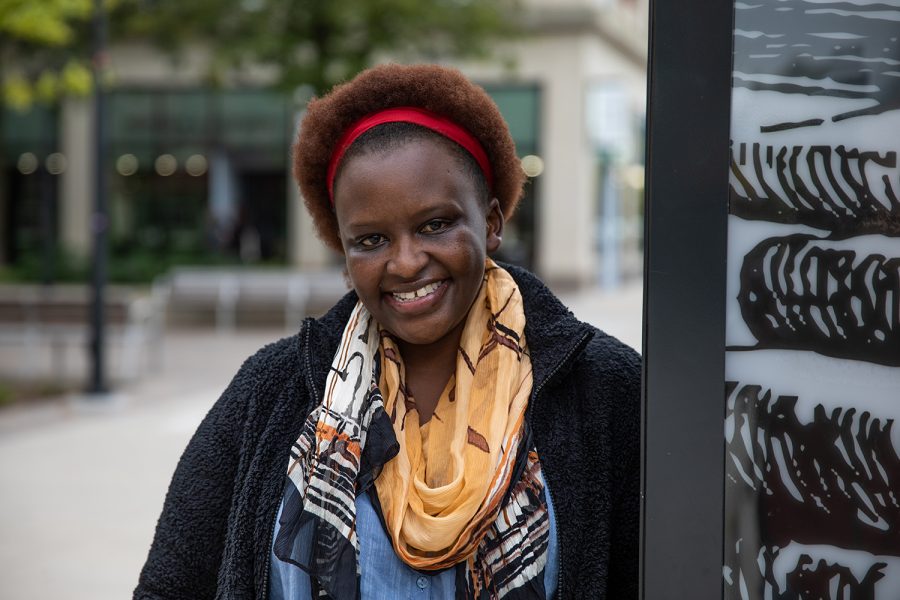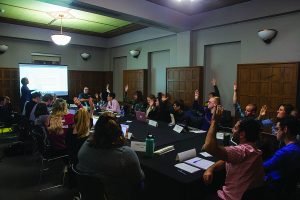UI’s own Barbara Kagima uses geographic tools to study public health in her home country of Kenya
University of Iowa Ph.D candidate Barbara Kagima’s preliminary research assessment focuses on the patterns, awareness, and treatment of non-communicable diseases across the country.
Ph.D. student Barbara Kagima poses for a portrait in downtown Iowa City on October 6th, 2019. Kagima is studying the treatment of hypertension and public health awareness in Kenyan villages.
October 9, 2019
University of Iowa Ph.D. candidate and Stanley Award for International Research winner Barbara Kagima recently spent a month in her home country of Kenya, visiting cities and villages to conduct preliminary research on the increasing prevalence of noncommunicable diseases in the area, particularly hypertension.
Kagima’s preliminary assessment looked into whether she could complete further research on the subject for her dissertation. Kagima moved to Iowa from Kenya during grade school and hopes to provide deeper insight into an issue in the region that only caught the attention of researchers in the last four years.
“Medicine and health in Sub-Saharan Africa has historically focused on malaria, HIV, [and] maternal health, but as economies continue to develop and people adapt to new diets and lifestyles, noncommunicable diseases have increased in prevalence,” Kagima said. “The patterns of these diseases are not well understood.”
Kagima said she is passionate about finding patterns in data and explaining why they exist. She uses geographic information systems to visualize data and trends — a skill Kagima said she honed while pursuing her master’s at Iowa State University and later working in Kenya for nonprofit organizations.
Kagima worked as a data analyst and with geographic information tools. She later surveilled livestock for disease that affected local economies at the International Centre of Insect Physiology and Ecology.
“I think geography is an important tool to understand factors related to everyone living a good and healthy life,” Kagima said. “It helps us see patterns in food security, health, and livelihood.”
Kagima’s motivation in researching this subject stemmed from the fact that many Kenyans suffer from noncommunicable diseases, and most are unaware. According to a recent publication by BMC Public Health, the prevalence for hypertension in Kenya during 2015 was 24.5 percent — and 84.4 percent of those affected were unaware of their condition.
RELATED: University of Iowa junior to experience Indonesia on U.S. State Department scholarship
Kagima said the main problems for rural areas combatting diseases such as hypertension is an overwhelming lack of resources, treatment options, and education of symptoms. In her trip to Kenya over the summer, Kagima said she tried to understand how victims were receiving help by talking to various officials familiar with the epidemic.
Department of Geographical and Sustainability Sciences Associate Professor Margaret Carrel worked with Kagima closely as her adviser and on her research proposal. In an email to The Daily Iowan, Carrel described the methodology and planning behind Kagima’s recent trip.
“Her time in Kenya this summer was spent gathering information from health-care practitioners in rural and urban places about their education programs and priorities for patients,” Carrel said. “The work plan developed over time as she thought about what sorts of background knowledge would be needed to situate her work in the local context.”
Kagima’s trip to Kenya was made possible by the UI Stanley Award for International Research, which is funded by the Stanley-UI Foundation Support Organization. The annual award is given to both undergraduate and graduate students hoping to complete research internationally that relates to their academic and career goals.
“For students from all disciplines, it’s a must to define their methodology,” Associate Director in International Fellowships and facilitator of the award Karen Wachsmuth said. “They have to be aware that they’re looking for something before they go.”
Wachsmuth said that refined methodology is a vital trait of a successful research proposal.
“I loved being able to visit very rural parts of Kenya through my work and understand the nuances of social inequality in a developing nation,” Kagima said.






